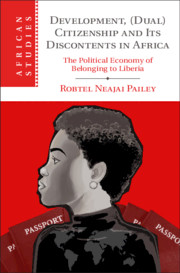 Development, (Dual) Citizenship and Its Discontents in Africa
Development, (Dual) Citizenship and Its Discontents in Africa Published online by Cambridge University Press: 07 January 2021
Chapter 5 indicates that migration to and from Liberia in the nineteenth, twentieth, and twenty-first centuries profoundly modified the meaning and practice of citizenship by creating categories of Liberians that have defied the legal definition of citizen. In 1847, Liberia was a country of relative immigration yet citizenship norms were biased against those considered ‘rooted’—primarily the 16 ethnic groups already occupying the territory were formally excluded from the institution of citizenship. In 2019, however, while Liberia exemplified a country of relative emigration citizenship norms were biased against those deemed ‘rootless’—essentially jus soli Liberians who naturalised abroad and jus sanguinis Liberians who maintained their birthplace citizenship remained excluded from formal Liberian citizenship. This chapter moves beyond the rhetoric of politicians and policy makers to underscore that ordinary Liberians’ contemporary notions of rootedness and rootlessness represent a continuum of sedentarist and nomadic metaphysical thinking thereby simultaneously challenging and strengthening claims for dual citizenship. While motivations for not naturalising abroad—largely based on sedentarist metaphysics—have challenged core assumptions about the necessity of dual citizenship for Liberia, motivations for naturalising—largely based on nomadic metaphysics—have galvanised proponents of such a policy prescription and development intervention.
To save this book to your Kindle, first ensure no-reply@cambridge.org is added to your Approved Personal Document E-mail List under your Personal Document Settings on the Manage Your Content and Devices page of your Amazon account. Then enter the ‘name’ part of your Kindle email address below. Find out more about saving to your Kindle.
Note you can select to save to either the @free.kindle.com or @kindle.com variations. ‘@free.kindle.com’ emails are free but can only be saved to your device when it is connected to wi-fi. ‘@kindle.com’ emails can be delivered even when you are not connected to wi-fi, but note that service fees apply.
Find out more about the Kindle Personal Document Service.
To save content items to your account, please confirm that you agree to abide by our usage policies. If this is the first time you use this feature, you will be asked to authorise Cambridge Core to connect with your account. Find out more about saving content to Dropbox.
To save content items to your account, please confirm that you agree to abide by our usage policies. If this is the first time you use this feature, you will be asked to authorise Cambridge Core to connect with your account. Find out more about saving content to Google Drive.